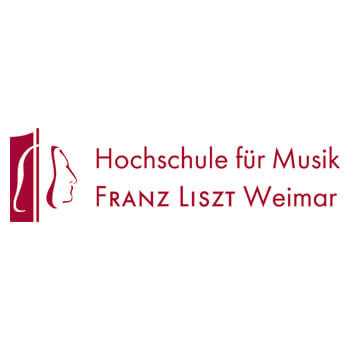College of Music Franz Liszt, Weimar

Founded: 1872
Address: Platz der Demokratie 2/3 - Weimar, Germany
Phone: +49 3643 5550
Address: Platz der Demokratie 2/3 - Weimar, Germany
Phone: +49 3643 5550
Here you find out College of Music Franz Liszt, Weimar complete information about fees, location, degree College of Music Franz Liszt, Weimar offers, number, website, and much more. College of Music Franz Liszt, Weimar is a leading university in Weimar - Germany.
You can also find out jobs at College of Music Franz Liszt, Weimar for students, teachers, and professors. We also update the database for an internship at College of Music Franz Liszt, Weimar for students.
Based in the home-town of German Classicism and rich in tradition, the University of Music FRANZ LISZT Weimar is an institution of higher education for young musicians, academics, and ambassadors of music from across the entire globe. It is indebted to the legacy of Franz Liszt, who successfully combined in his person composer, virtuoso, ensemble musician, pedagogue, and pensive philosopher. Th...e institution aims to compete with the world’s most renowned music academies.
The envisaged outcome of an education at Weimar is the ideal artistic, academic, and pedagogic personality — a figure expressed equally well in performance, musical research, and music mediation. Such a person has at its command a pool of general knowledge regarding the world’s and Europe’s cultural heritage, and holds deep insights into contemporary culture. They are confident music entrepreneurs, active in diverse areas; they have obtained the skills necessary to be successful in the international cultural sphere.
The University of Music FRANZ LISZT Weimar gives particular weight to a strong sense of team-spirit in teaching and performance alike, in its dialogue with scholarship, and in its many co-operations with the professional music world. It supports personal initiatives, and encourages the distillation of an individual profile. The school"s teaching centres around the modern musician as an ensemble player who brings to life artistic ideals across diverse periods and styles, in a range of settings and contexts, from musical performance and scholarship to music mediation.
The LISZT UNIVERSITY provides broad, cosmopolitan competencies in all areas relevant to the current fields of musical performance, scholarship, and music mediation. It seeks to reflect and communicate the musics of the world in as many facets as possible, and pays particular attention to processes of transcultural transfer.
In exemplary manner, the LISZT UNIVERSITY is engaged in the promotion of exceptionally gifted children and adolescents from an early age, and consequently includes in its educational portfolio the Music High School for talented musicians at Schloss Belvedere.
The University of Music FRANZ LISZT Weimar is proud to have its home in the Thuringian town of Weimar. It grasps the opportunities offered by its historical rootedness in this region: in its close ties with other cultural institutions in the state of Thuringia, as well as intellectually, continuing the tradition represented by this heartland of culture and of European art music. It dedicates its work to the promotion of the Baroque music of the country"s churches and residencies, the music of Weimar Classicism, and the efforts of Franz Liszt and his circle surrounding a renovation of music during the nineteenth century. Weimar"s living tradition of the Bauhaus movement also suggests the active engagement with the music of the historical and contemporary avant-gardes, with particular weight being given to interdisciplinary considerations.
Weimar is a good choice to study music: the classical city situated on the Ilm has approximately 950 students with almost ideal studying conditions. Four completely renovated and historically important locations are distributed around the city but are nevertheless within walking distance of each other. One can study almost every aspect of music: all orchestral instruments, piano, guitar, accordion, voice, theatre, organ, early music, composition, conducting, school music and music pedagogy. In addition, jazz and music theory, musicology and arts management are offered.
Those who decide to study at the University of Music FRANZ LISZT Weimar receive the best quality teachers in a European city of culture. A lively history including Goethe and Schiller and Bach and Liszt greets the students, just as the active organization today does. We can take the ultramodern studio of electro-acoustic music as such an example which works in co-operation with the neighbouring Bauhaus University. Other examples include: the first children"s university at a German school of music and the establishment of an international branch - the German School of Music Weimar in South Korea.
It was Franz Liszt who first had the idea to establish a school of music in Weimar: already in 1835 he had thoughts about the establishment of "progress schools of music". Highly-qualified instrumentalists had to be sought after, in order to make the orchestras efficient enough for the new music of their time. For a long time Liszt fought to establish a training centre for orchestral musicians in Weimar, but it was first in 1872 that Liszt"s pupil Carl Muellerhartung realised this dream and established the first orchestral school in Germany.
Training on all orchestral instruments, the piano and conducting were available and extra areas were soon added such as: voice, opera and theatre, composition, teacher training for instrumental and voice teachers as well as the expected training of genuine virtuosos. Therefore the training centre was first called "Orchestra School", then "School of Music and Orchestra", later "Orchestras-, Music and Opera School" and finally "Music-, Opera and Theatre School". In 1947 the theatrical department closed again (although the opera school remained). In 1948 musicology was recognised as a viable academic subject and was integrated into the mandatory academic fields - the curriculum as we know it today was thereby complete. Since 1956 the school bears the name of its initiator.
In the 1990"s, the four historically important centres of the LISZT UNIVERSITY which were scattered around the city were interlocked. All the buildings were renovated and furnished to provide suitable conditions for music tuition. Thus the main building of the school – the Fürstenhaus am Platz der Demokratie - is a direct neighbour of the Weimar market place. In this building, which was built around 1770, the departments for string and piano, the library and the school management can be found. Likewise, the monastery building (the Klostergebäude Am Palais) situated in the city centre is the location where school music and church music are taught.
A beautiful view over the city and the Ilm can be seen from the imposing school centre (hochschulzentrum am horn), which accommodates the jazz, brass, and woodwind departments, music education, musicology, arts management and the Thuringian national music archives. Behind the old walls of all of these buildings are modern premises, which are completely co-ordinated to meet the needs of their users: The modern concert hall in the Fürstenhaus and the rehearsal rooms for ensemble am Horn offer adjustable acoustics and a direct connection to the recording studio. The sound screens in the classrooms are highly updated.
The fourth location is surely the most picturesque: The singers, guitarists and accordionists learn and practice in the old houses (Kavaliershäuser) in the park of the Belvedere Palace (Schloss Belvedere). The Music High School Schloss Belvedere, whose pupils receive tuition exclusively from teachers and professors of the LISZT UNIVERSITY is also situated there and provides optimal conditions for the preparation of future study.
The most important goal of the University of Music FRANZ LISZT Weimar is to prepare its students for their future careers as comprehensively as possible. That means for e.g. that the classical orchestral instrumentalists are not only offered private lessons and a committed orchestral school but also gain an insight into special branches such as baroque and contemporary music. A substantial element of the training are the rehearsals and concerts as an ensemble, whether it is with the school orchestra, the chamber orchestra, the jazz orchestra, the large school choir, the chamber choir, the early music ensemble or the opera school.
Well known guest professors are frequently invited in order to conduct concerts, to hold lectures and give lessons. Singers in the opera studio have the possibility of appearing in co-productions with other regional theatres. Thereby valuable practical experience can be gained, which makes the entrance into the music profession substantially easier.
Numerous international competitions and masterclasses which are organised every year also contribute to the good name of the University of Music FRANZ LISZT Weimar. In order to compare themselves with the international concurrence participants from all over the world come to Weimar to take part in: the LOUIS SPOHR Competition for Young Violinists, the JOSEPH JOACHIM Chamber Music Competition, the FRANZ LISZT Piano Competition, the BACH | LISZT Organ Competition and the GROTRIAN-STEINWEG Competition for piano for school musicians.
Every summer since 1958, the master classes in Weimar have offered an advanced intensive training for strings, woodwind/brass, singers and conductors. Pianists such as Paul Badura-Skoda or violinists such as Thomas Zehetmair guarantee the highest possible quality of teaching.
Study in Weimar has an abundance of advantages which are supplemented by the closely interlaced surrounding cultural field. The operatic and theatrical performances given by the German National Theatre and the Arts Festival under the auspice of Nike Wagner are only two examples which provide a view into the practice or seminar possibilities offered in Weimar. An abundance of museums, the Goethe and Schiller houses, the Liszt Museum and appearances of internationally renowned artists and orchestras in the Weimar Concert Hall complete the offer. Important Thuringian towns such as Eisenach, Erfurt and Jena are not far away and the concert halls and opera houses in Leipzig, Dresden and Berlin can be easily reached by frequent intercity trains.
The University of Music FRANZ LISZT Weimar is fit for the future requirements of music training centres - it keeps up with the international competition. The intensive support of all students later through Alumni belongs just as much to the making of professional artists during their study. In the country"s DAAD statistics the school ranks among the first places and would like to strengthen the contacts to approximately 60 European and international partners. But the starting point off all these efforts must be the quality of the teachers in Weimar - and fortunately nobody needs to worry about that.
You can also find out jobs at College of Music Franz Liszt, Weimar for students, teachers, and professors. We also update the database for an internship at College of Music Franz Liszt, Weimar for students.
Based in the home-town of German Classicism and rich in tradition, the University of Music FRANZ LISZT Weimar is an institution of higher education for young musicians, academics, and ambassadors of music from across the entire globe. It is indebted to the legacy of Franz Liszt, who successfully combined in his person composer, virtuoso, ensemble musician, pedagogue, and pensive philosopher. Th...e institution aims to compete with the world’s most renowned music academies.
The envisaged outcome of an education at Weimar is the ideal artistic, academic, and pedagogic personality — a figure expressed equally well in performance, musical research, and music mediation. Such a person has at its command a pool of general knowledge regarding the world’s and Europe’s cultural heritage, and holds deep insights into contemporary culture. They are confident music entrepreneurs, active in diverse areas; they have obtained the skills necessary to be successful in the international cultural sphere.
The University of Music FRANZ LISZT Weimar gives particular weight to a strong sense of team-spirit in teaching and performance alike, in its dialogue with scholarship, and in its many co-operations with the professional music world. It supports personal initiatives, and encourages the distillation of an individual profile. The school"s teaching centres around the modern musician as an ensemble player who brings to life artistic ideals across diverse periods and styles, in a range of settings and contexts, from musical performance and scholarship to music mediation.
The LISZT UNIVERSITY provides broad, cosmopolitan competencies in all areas relevant to the current fields of musical performance, scholarship, and music mediation. It seeks to reflect and communicate the musics of the world in as many facets as possible, and pays particular attention to processes of transcultural transfer.
In exemplary manner, the LISZT UNIVERSITY is engaged in the promotion of exceptionally gifted children and adolescents from an early age, and consequently includes in its educational portfolio the Music High School for talented musicians at Schloss Belvedere.
The University of Music FRANZ LISZT Weimar is proud to have its home in the Thuringian town of Weimar. It grasps the opportunities offered by its historical rootedness in this region: in its close ties with other cultural institutions in the state of Thuringia, as well as intellectually, continuing the tradition represented by this heartland of culture and of European art music. It dedicates its work to the promotion of the Baroque music of the country"s churches and residencies, the music of Weimar Classicism, and the efforts of Franz Liszt and his circle surrounding a renovation of music during the nineteenth century. Weimar"s living tradition of the Bauhaus movement also suggests the active engagement with the music of the historical and contemporary avant-gardes, with particular weight being given to interdisciplinary considerations.
Weimar is a good choice to study music: the classical city situated on the Ilm has approximately 950 students with almost ideal studying conditions. Four completely renovated and historically important locations are distributed around the city but are nevertheless within walking distance of each other. One can study almost every aspect of music: all orchestral instruments, piano, guitar, accordion, voice, theatre, organ, early music, composition, conducting, school music and music pedagogy. In addition, jazz and music theory, musicology and arts management are offered.
Those who decide to study at the University of Music FRANZ LISZT Weimar receive the best quality teachers in a European city of culture. A lively history including Goethe and Schiller and Bach and Liszt greets the students, just as the active organization today does. We can take the ultramodern studio of electro-acoustic music as such an example which works in co-operation with the neighbouring Bauhaus University. Other examples include: the first children"s university at a German school of music and the establishment of an international branch - the German School of Music Weimar in South Korea.
It was Franz Liszt who first had the idea to establish a school of music in Weimar: already in 1835 he had thoughts about the establishment of "progress schools of music". Highly-qualified instrumentalists had to be sought after, in order to make the orchestras efficient enough for the new music of their time. For a long time Liszt fought to establish a training centre for orchestral musicians in Weimar, but it was first in 1872 that Liszt"s pupil Carl Muellerhartung realised this dream and established the first orchestral school in Germany.
Training on all orchestral instruments, the piano and conducting were available and extra areas were soon added such as: voice, opera and theatre, composition, teacher training for instrumental and voice teachers as well as the expected training of genuine virtuosos. Therefore the training centre was first called "Orchestra School", then "School of Music and Orchestra", later "Orchestras-, Music and Opera School" and finally "Music-, Opera and Theatre School". In 1947 the theatrical department closed again (although the opera school remained). In 1948 musicology was recognised as a viable academic subject and was integrated into the mandatory academic fields - the curriculum as we know it today was thereby complete. Since 1956 the school bears the name of its initiator.
In the 1990"s, the four historically important centres of the LISZT UNIVERSITY which were scattered around the city were interlocked. All the buildings were renovated and furnished to provide suitable conditions for music tuition. Thus the main building of the school – the Fürstenhaus am Platz der Demokratie - is a direct neighbour of the Weimar market place. In this building, which was built around 1770, the departments for string and piano, the library and the school management can be found. Likewise, the monastery building (the Klostergebäude Am Palais) situated in the city centre is the location where school music and church music are taught.
A beautiful view over the city and the Ilm can be seen from the imposing school centre (hochschulzentrum am horn), which accommodates the jazz, brass, and woodwind departments, music education, musicology, arts management and the Thuringian national music archives. Behind the old walls of all of these buildings are modern premises, which are completely co-ordinated to meet the needs of their users: The modern concert hall in the Fürstenhaus and the rehearsal rooms for ensemble am Horn offer adjustable acoustics and a direct connection to the recording studio. The sound screens in the classrooms are highly updated.
The fourth location is surely the most picturesque: The singers, guitarists and accordionists learn and practice in the old houses (Kavaliershäuser) in the park of the Belvedere Palace (Schloss Belvedere). The Music High School Schloss Belvedere, whose pupils receive tuition exclusively from teachers and professors of the LISZT UNIVERSITY is also situated there and provides optimal conditions for the preparation of future study.
The most important goal of the University of Music FRANZ LISZT Weimar is to prepare its students for their future careers as comprehensively as possible. That means for e.g. that the classical orchestral instrumentalists are not only offered private lessons and a committed orchestral school but also gain an insight into special branches such as baroque and contemporary music. A substantial element of the training are the rehearsals and concerts as an ensemble, whether it is with the school orchestra, the chamber orchestra, the jazz orchestra, the large school choir, the chamber choir, the early music ensemble or the opera school.
Well known guest professors are frequently invited in order to conduct concerts, to hold lectures and give lessons. Singers in the opera studio have the possibility of appearing in co-productions with other regional theatres. Thereby valuable practical experience can be gained, which makes the entrance into the music profession substantially easier.
Numerous international competitions and masterclasses which are organised every year also contribute to the good name of the University of Music FRANZ LISZT Weimar. In order to compare themselves with the international concurrence participants from all over the world come to Weimar to take part in: the LOUIS SPOHR Competition for Young Violinists, the JOSEPH JOACHIM Chamber Music Competition, the FRANZ LISZT Piano Competition, the BACH | LISZT Organ Competition and the GROTRIAN-STEINWEG Competition for piano for school musicians.
Every summer since 1958, the master classes in Weimar have offered an advanced intensive training for strings, woodwind/brass, singers and conductors. Pianists such as Paul Badura-Skoda or violinists such as Thomas Zehetmair guarantee the highest possible quality of teaching.
Study in Weimar has an abundance of advantages which are supplemented by the closely interlaced surrounding cultural field. The operatic and theatrical performances given by the German National Theatre and the Arts Festival under the auspice of Nike Wagner are only two examples which provide a view into the practice or seminar possibilities offered in Weimar. An abundance of museums, the Goethe and Schiller houses, the Liszt Museum and appearances of internationally renowned artists and orchestras in the Weimar Concert Hall complete the offer. Important Thuringian towns such as Eisenach, Erfurt and Jena are not far away and the concert halls and opera houses in Leipzig, Dresden and Berlin can be easily reached by frequent intercity trains.
The University of Music FRANZ LISZT Weimar is fit for the future requirements of music training centres - it keeps up with the international competition. The intensive support of all students later through Alumni belongs just as much to the making of professional artists during their study. In the country"s DAAD statistics the school ranks among the first places and would like to strengthen the contacts to approximately 60 European and international partners. But the starting point off all these efforts must be the quality of the teachers in Weimar - and fortunately nobody needs to worry about that.
Read More
Details:
LeaderShip: President: Prof. Dr. Christoph Stölzl President
Fees:
Time:
Phone Number: +49 3643 5550
City: Weimar
Fees:
Time:
Phone Number: +49 3643 5550
City: Weimar
Timing:
Country: Germany
Staff:
Website: http://www.hfm-weimar.de
Country: Germany
Staff:
Website: http://www.hfm-weimar.de
Subjects:
Video:
Jobs in College of Music Franz Liszt, Weimar
Currently, there is no job opening in College of Music Franz Liszt, Weimar as per our database.



















Leave a Reply